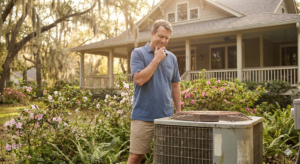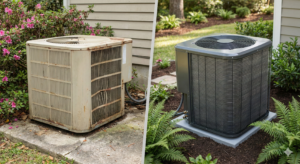Hearing unusual sounds coming from your HVAC system can be frustrating. Whether it’s a loud hum, a clanking noise, or a rattling vibration, it can grab your attention fast. While HVAC systems aren’t meant to be totally silent, excessive or strange noises usually mean something’s wrong. Over time, these issues can lead to bigger problems or make your system work harder than it should. That means more strain, possible damage, and higher energy bills.
In a place like Charleston, where heat and humidity stick around for much of the year, it’s even more important to keep your system running smoothly. Unchecked noise problems don’t just mess with your comfort—they could point to safety issues or system failure down the line. Before things get worse, it helps to understand why these noises happen and how to respond to them.
Common Causes of HVAC Noise
HVAC systems rely on several moving parts, and any one of them could be the source of an odd sound. Identifying the type of noise you’re hearing can give you a clue about what’s going wrong. Some sounds are just annoying. Others are red flags that shouldn’t be ignored.
Here are a few of the most common reasons your HVAC system might be making noise:
– Loose parts: Screws, bolts, or panels that aren’t fully tightened may rattle or vibrate. Over time, normal use can shake components loose.
– Ductwork issues: If metal ducts aren’t sealed properly or are too narrow for your system, they can rumble, pop, or whistle when air flows through.
– Blower problems: A blower wheel covered in dust or slightly off-balance can cause a thumping or scraping noise when it spins.
– Motor trouble: A failing motor might buzz, hum, or even grind as it struggles to work.
– Dirty or clogged filters: When filters are clogged with dust, the system works harder to push air through, which might cause hissing or whooshing sounds.
– Refrigerant problems: If there’s a leak or pressure imbalance, you might hear hissing or bubbling as refrigerant moves through the lines.
One example that often comes up in Charleston homes is banging or knocking noises right after the system turns off. This tends to happen when warm metal ducts quickly cool and contract. It might seem harmless at first, but if it gets louder or more frequent, it’s something worth looking into.
Being familiar with these noises can help you decide what type of issue you’re dealing with and how quickly you need to act. Some are quick fixes, but others may call for a professional’s help to avoid further damage or a full breakdown.
Troubleshooting HVAC Noise Issues
Before jumping to conclusions, it’s best to do a little investigating. Some HVAC noise problems can be simple to figure out as long as you’re safe about it. Here’s a straightforward way to start narrowing things down:
1. Turn off the system: Before you do anything, shut off power to your unit. This keeps things safe and helps reset the system if needed.
2. Listen closely: Try to pinpoint where the noise is coming from. Is it inside the home, near a vent, or outside by the AC unit?
3. Check air filters: Pull out air filters and look for dust buildup. Clogged filters restrict air and can create whistling or buzzing sounds.
4. Look for loose panels or screws: These are often found on the outdoor unit. Tighten them if you notice rattling or clanking when the system’s running.
5. Inspect vents and ducts: See if any vents are fully closed or if something’s blocking airflow. Also check for dents or gaps in visible ductwork.
6. Watch the fan blades: With the system off, peek inside the outdoor unit. Make sure nothing is caught in the blades, and see if they spin freely.
While some of these checks are safe for most homeowners, deeper issues like refrigerant leaks, motor failure, or electrical problems should never be tackled alone. If the noise continues after basic checks or you notice burnt smells or smoke, it’s time to get help. Problems like these can turn into emergencies if left alone, especially during Charleston’s long cooling season when your system is under extra pressure.
When to Call an Emergency HVAC Company
While some HVAC noise issues are minor, there are times when getting professional help is the safest and smartest choice. If your system is making loud banging or grinding noises, that’s a sign something could be seriously wrong. Problems like a failing motor or a damaged blower wheel often cause these sounds, and addressing them fast can prevent more extensive damage.
If the noise is paired with other signs like a sudden spike in your energy bill, uneven cooling in some rooms, or if the AC isn’t cooling at all, these are strong signals that something needs immediate attention. Trying to fix these bigger problems without experience might cause more harm and could even void your system’s warranty.
Another major warning sign is the smell of something burning or seeing visible smoke come from the unit. That can mean an electrical issue, which is not only bad for your HVAC system but potentially dangerous for your whole home.
When any of these situations appear, calling an emergency HVAC company in Charleston is the best next step.
Prevention Tips to Avoid Future HVAC Noise
Once you’ve dealt with an HVAC noise issue, the goal is to stop it from happening again. Staying ahead of future breakdowns means keeping your system in top shape. Regular maintenance can help prevent noise problems and extend the life of your equipment. Here are a few easy things you can keep up with around your home:
– Schedule regular HVAC check-ups with a professional. A trained technician can spot early warning signs and fix things before they become serious.
– Change air filters often. This keeps airflow normal and reduces unnecessary strain on your system.
– Keep the outdoor unit clean and clear of debris. Leaves and dirt can slip into moving parts and create clunks or rattles.
– Make sure all vents are open and unobstructed. Blocked vents can lead to uneven airflow and unexpected noises in some rooms.
These small steps help your HVAC system work quietly and efficiently through the year.
Keeping Your Charleston Home Quiet and Comfortable
Living in Charleston means depending on your HVAC system for relief from hot, humid weather nearly all year long. That’s why it’s so important to stay on top of anything that sounds off. Strange noises might seem like a small issue, but they usually point to something bigger. Whether it’s a loose part, a dirty filter, or something more serious, catching it early can protect both your comfort and your wallet.
Don’t ignore those strange sounds coming from your HVAC unit. Regular service and a trained eye go a long way in keeping your home quiet and cool. When in doubt, reach out to professionals who understand the unique needs of Charleston homes and can help keep your system running the way it should.
If your HVAC system in Charleston is making strange sounds that won’t go away, it might be time to call in the pros. A trusted emergency HVAC company can respond quickly when you need fast solutions and peace of mind. Coastal Carolina Comfort is here to get your home back to quiet, cool comfort no matter the season. Reach out today to make sure your system is in expert hands.


